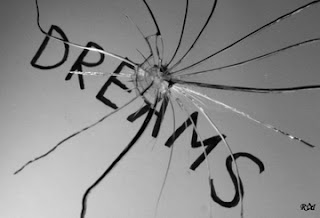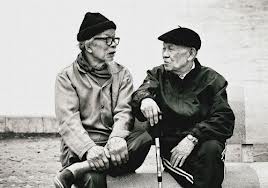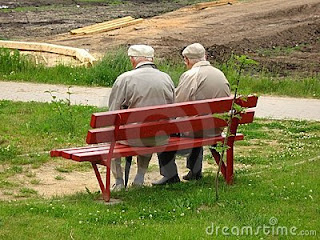Where do broken dreams go?
A Sermon preached at St. Barnabas Episcopal Church, Willmington, DE
Easter III - April 30, 2017
(The Rev'd Dr) Elizabeth Kaeton
As Joe Biden would say, “Here’s the deal”. Let me put the gospel into context for you.
“Now on that same day” – that day being three days after the trial, torture, crucifixion, and death of Jesus
– that same day – “at early dawn” – when Luke reports that the women had gone with their spices to the tomb and found the stone rolled away
– that same day when they found the tomb empty except for two men in dazzling white clothing who terrified the women and said, “He is risen”
– that same day when Luke reports that the women told what they had seen and heard and been told “to the eleven and all the rest”
– that same day when none of the men believed them and Peter jumped up and ran to the tomb and stooped to look in and see for himself and was amazed at what happened….
– that same day – “at early dawn” – when Luke reports that the women had gone with their spices to the tomb and found the stone rolled away
– that same day when they found the tomb empty except for two men in dazzling white clothing who terrified the women and said, “He is risen”
– that same day when Luke reports that the women told what they had seen and heard and been told “to the eleven and all the rest”
– that same day when none of the men believed them and Peter jumped up and ran to the tomb and stooped to look in and see for himself and was amazed at what happened….
Now on that same day – later in the day, we presume – “two of them” – two of his followers (but, apparently, not one of the eleven) – were going to a village called Emmaus.
Now, Emmaus is about 7 miles north and east of Jerusalem – at a leisurely pace, that’s about a 2-hour walk. That’s not a bad walk for just getting out to clear your head and get away from the places where everyone else was hiding for fear of persecution.
Now, Emmaus is about 7 miles north and east of Jerusalem – at a leisurely pace, that’s about a 2-hour walk. That’s not a bad walk for just getting out to clear your head and get away from the places where everyone else was hiding for fear of persecution.
Luke says they were “walking and talking” with each other about everything that had happened just three days before. I’m sure they were just trying to wrap their heads around what the heck had happened in a week’s time.
– only just a week’s time, we should remember -
– since the glorious entry of their beloved Jesus into the city of Jerusalem when everyone cheered him and threw palms and their cloaks beneath his feet and waved palms in his honor.
– only just a week’s time, we should remember -
– since the glorious entry of their beloved Jesus into the city of Jerusalem when everyone cheered him and threw palms and their cloaks beneath his feet and waved palms in his honor.
How could the world have turned upside down in just a week’s time?
How could everything they knew and understood about the future be taken away so suddenly?
What about all the miracles they had witnessed? Wasn't God in those miracles? Where was God now?
What about everything Jesus had taught them? What about all their dreams of a new way?
How could everything they knew and understood about the future be taken away so suddenly?
What about all the miracles they had witnessed? Wasn't God in those miracles? Where was God now?
What about everything Jesus had taught them? What about all their dreams of a new way?
Where do broken dreams go to die?
Now, on that same morning, that’s the question I want to stay with this morning, all those many centuries later. Where do broken dreams go when they die? Where do they hide while we bring spices to the empty tombs where we thought we had them buried? Where do they wait to be resurrected?
I have a hard time believing this myself, but I have been ordained a little over 30 years (I was just a child). I have worked as a college chaplain, a vicar of a small, struggling inner city congregation, a rector of an affluent suburban congregation, a Canon Missioner, and an activist in The Episcopal Church around issues of institutional prejudice and oppression.
These last five years I have been working as a Hospice Chaplain. In this position, I am surrounded daily by dying and death, sorrow and sadness, broken hearts and released spirits. It is intense work but it is deeply satisfying to my soul, yea, even unto the very marrow of my bones.
I am richly blessed to be able to do this work. I think I finally know enough stuff - and know how much I don't know - to now be able to do this work.
I am richly blessed to be able to do this work. I think I finally know enough stuff - and know how much I don't know - to now be able to do this work.
I am often asked, “How DO you do it?” And, just as often, “How CAN you do this work? Don’t you get depressed? Doesn’t it make you sad?”
My short answer is, almost always, “I couldn’t do this work if I didn’t believe in the resurrection.”
And, that is not a lie. That is absolutely the truth for me.
And, that is not a lie. That is absolutely the truth for me.
The longer answer is that I am one of those ancient followers of Jesus; I am still walking the road from Jerusalem to Emmaus, talking with fellow followers of Jesus, trying to get my head wrapped around all the events of that week - from cries of “Hosanna” in Jerusalem to shouts of “Crucify Him” on the road to Calvary.
- from the last three days from “It is finished” at Calvary to the silence of the empty tomb.
- from the upper room in Jerusalem, filled with the ice-cold silence of fear, to the road to Emmaus where everyone asked, “What has happened?”.
And then, back to that upper room in Jerusalem where the women were first to shatter their walls of anxiety and grief with the Easter proclamation, “He is risen!”
I have come to understand even more deeply the words of the Eucharistic prayer we say at funerals in which we proclaim that “life is changed, not ended.”
Hear that again, “life is changed, not ended.”
That is not sappy Hallmark sentimentality or new age poetry. That, my friends, is a bold statement of faith in the power of the resurrection.
Hospice has taught me to love the empty tomb because I know it is only as empty as the limits of my faith. And, that’s what I believe the women and Peter saw when they looked into that empty tomb.
What they saw was not the end. What they saw was possibility. What they saw was hope.
What they saw was the truth that faith sees beyond fate.
Let me say that again, faith sees beyond fate.
Let me say that again, faith sees beyond fate.
It didn’t take Hospice to learn that life can sometimes turn on a dime. Some of you already know that the end of the time of this life can come swiftly and unexpectedly, but no matter how long it takes – an hour, a day, two weeks, a month, a year – death always comes too soon for some of us and not soon enough for others.
And, no one knows or has control of that time.
Sometimes, in order to cope with the uncertainty of life, some of us wander off the beaten path – to the road less traveled – to journey just seven miles north and east – a mere two-hour walk – of the epicenter of things, where we try to understand.
I am reminded that JRR Tolkein once wrote, “All who wander are not lost.” At some points in our lives of faith, we need to wander in order to find ourselves – to find what is truth for us.
Sometimes, in order to cope with the uncertainty of life, some of us need to build shelters and sanctuaries for ourselves.
Using as an illustration the story of Noah's ark, when the entire world was being destroyed by flood except for those on the ark that Noah built, the philosopher and writer Noah benShea wrote about some of the lessons we can learn from that story.
Using as an illustration the story of Noah's ark, when the entire world was being destroyed by flood except for those on the ark that Noah built, the philosopher and writer Noah benShea wrote about some of the lessons we can learn from that story.
He writes, “…. In the story of Noah, even in the flood of death, it is the flood that supports the ark of life.”
Even in the flood of death, it is the flood that supports the ark of life.
Can you take that in? Even in the flood of death, it is the flood that supports the ark of life.
Can you take that in? Even in the flood of death, it is the flood that supports the ark of life.
Look at the architecture of this church. See the roof? Ever notice that it looks like the inside of the bottom of a boat? That’s intentional. It’s an illusion to Noah’s ark and the promise of God that the earth would never again be destroyed.
Even the architecture of a church reminds us of the sacred stories of our faith and reminds us that this building, this church, is a safe place – a sanctuary – against the forces of destruction in the world.
Even the architecture of a church reminds us of the sacred stories of our faith and reminds us that this building, this church, is a safe place – a sanctuary – against the forces of destruction in the world.
Hospice has taught me that we all need sanctuaries. For many of us, that is the church. But, others of us build our own sanctuaries – in addition to or the exclusion of – the building or the structures of the institutional church.
benShea writes,
“The lesson of Noah teaches us that there comes a time in each of our lives when it is necessary to build an ark, to create a structure in which we can hide – a habit or a place or an attitude within ourselves that will shelter us – if we are to survive life’s terrible storms.”
“Noah was told to put a window in the ark so he could tell when the rain had stopped, and so we can remind others who have struggled to survive that they, too, should put a window in their ark, so all of us will know when it is time to come out from behind the habit of walls we build to survive.”“And (then) we will see that the world is not always filled with a flood.”
Hospice has taught me that whether there is an empty tomb or a window in the shelters and sanctuaries of our lives, I - we all need community - people with whom to walk and talk in order to find a faith that sees beyond fate.
We need community - to walk and talk with others - to find a faith with a heart to embrace the mystery and paradox that even in the flood of death, it is the flood that supports the ark of life.
We need community - to walk and talk with others - in order to place a window in our ark, so that we will know when it is time to come out from behind the habit of the walls we build to survive.
We need community - to walk and talk with others - to find a faith with a mature soul which is a window to allow us to see that the world is not always filled with a flood.
Here's the deal: I don’t believe they do die. Well, not all of them.
Neither do I believe they stick around, lurking like ghosts, locked in tombs of death.
I think they find a way to roll back the stone or make their way to the top of the waves of the flood where we see them through the window, dancing in the light mist of the white sea foam.
Neither do I believe they stick around, lurking like ghosts, locked in tombs of death.
I think they find a way to roll back the stone or make their way to the top of the waves of the flood where we see them through the window, dancing in the light mist of the white sea foam.
I think they go somewhere out there, hiding just behind twinkling stars in the sky. Indeed, I think it is the brokenness of dreams - the cracks which let the Light shine - which cause stars to twinkle. (The disciples were only able to see Jesus after the BREAKing of the bread). I believe our dreams are somewhere along the road, not far off, where they wait to be discovered and resurrected.
These weeks of Eastertide before Pentecost provide us a time to find and rediscover and resurrect broken dreams. Now. Today. Right now. On this same day -
– is one of those times -
- to allow your eyes to be opened to see the truth which has been walking along side of you, just seven miles to the north and east, a mere two hour walk from the epicenter of things.
To rediscover the hope that comes from choosing to believe.
– is one of those times -
- to allow your eyes to be opened to see the truth which has been walking along side of you, just seven miles to the north and east, a mere two hour walk from the epicenter of things.
To rediscover the hope that comes from choosing to believe.
And, if I’ve learned nothing else from Hospice, it is that belief is a choice.
And, what of faith?
Faith is the gift we are given for making the choice to believe what we believe.
What broken dream are you grieving this morning? Everyone has them. What are yours?
What has died in your life that you are waiting for resurrection?
What is dancing in the mist of the floodwaters that you thought destroyed your dream?
Where is the window in your ark? Look outside. What do you see?
What is the empty tomb in your life? Run to it. Stoop and look inside. What do you see?
Now is the time. Today is the day.
Now, on this same day, walk the road to Emmaus with some friends and find your broken dream.
It will be right there, walking right beside you.
Now, on this same day, walk the road to Emmaus with some friends and find your broken dream.
It will be right there, walking right beside you.
Waiting to be reborn. Waiting for new life.
Waiting to tell you all the stories that brought you to the point where you could dare to dream the dream.
Your dream is waiting – now, on this same day – to discover the joy that the disciples first knew.
He is risen! Alleluia! He is risen, indeed! Alleluia!
He is risen! Alleluia! He is risen, indeed! Alleluia!
Amen.


























